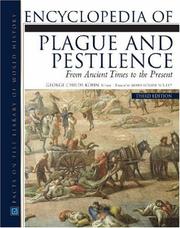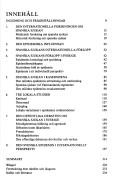| Listing 1 - 10 of 63 | << page >> |
Sort by
|

ISBN: 9780816069354 0816069352 Year: 2008 Publisher: New York : Facts On File,
Abstract | Keywords | Export | Availability | Bookmark
 Loading...
Loading...Choose an application
- Reference Manager
- EndNote
- RefWorks (Direct export to RefWorks)
"Tracing the history of infectious diseases from the Philistine plague of the 11th century B.C. to the recent SARS and avian influenza scares, Encyclopedia of Plague and Pestilence, Third Edition is a single-volume, A-to-Z reference offering comprehensive international coverage of the fascinating subject of epidemic diseases." "This volume provides concise descriptions of more than 720 epidemics, listed alphabetically by location of the outbreak. Each detailed entry includes when and where a particular epidemic began, how and why it happened, who it affected, how it spread and ran its course, and its outcome and significance." "Further readings, numerous cross-references, illustrative drawings and photographs, and maps, in addition to a substantial bibliography, time line, extensive general index, and subject indexes by disease and geographic area, make the information easily accessible. Plague and Pestilence, Third Edition is an invaluable reference for anyone with an interest in biology, history, or medicine." --Résumé de l'éditeur.
Épidémies --- épidémie --- Histoire --- Encyclopédies.
Book
ISBN: 9782130584094 2130584098 Year: 2010 Publisher: Paris: PUF,
Abstract | Keywords | Export | Availability | Bookmark
 Loading...
Loading...Choose an application
- Reference Manager
- EndNote
- RefWorks (Direct export to RefWorks)
Book
ISBN: 2804011410 9782804011413 Year: 1996 Volume: 7 Publisher: Bruxelles: Labor,
Abstract | Keywords | Export | Availability | Bookmark
 Loading...
Loading...Choose an application
- Reference Manager
- EndNote
- RefWorks (Direct export to RefWorks)
French literature (outside France) --- Epidémies --- Peur --- Prejuges --- Sida --- Contes --- Romans --- Epidémies - Romans --- Peur - Romans --- Prejuges - Romans --- Sida - Romans --- Contes - Belgique --- Littérature jeunesse

ISBN: 0385112564 Year: 1976 Publisher: Oxford : B. Blackwell,
Abstract | Keywords | Export | Availability | Bookmark
 Loading...
Loading...Choose an application
- Reference Manager
- EndNote
- RefWorks (Direct export to RefWorks)
Civilization --- Disease Outbreaks --- Epidemics --- Epidémies --- Civilisation --- history --- History --- Histoire --- History. --- Epidémies --- history.
Book
ISBN: 2010042123 9782010042126 Year: 1978 Publisher: Paris: Hachette,
Abstract | Keywords | Export | Availability | Bookmark
 Loading...
Loading...Choose an application
- Reference Manager
- EndNote
- RefWorks (Direct export to RefWorks)
Epidemics --- Civilization --- Epidémies --- Civilisation --- History --- Histoire --- Epidémies --- Histoire sociale --- Epidemics - History --- Civilization - History --- Peste

ISBN: 9155425879 9789155425876 Year: 1990 Volume: 160 Publisher: Stockholm: Almqvist och Wiksell,
Abstract | Keywords | Export | Availability | Bookmark
 Loading...
Loading...Choose an application
- Reference Manager
- EndNote
- RefWorks (Direct export to RefWorks)
Influenza --- Sweden --- Epidemics --- 20th century --- Grippe espagnole --- Epidemies --- Suede --- 20e siecle
Book
ISBN: 0140551395 Year: 1979 Publisher: Harmondsworth : Penguin,
Abstract | Keywords | Export | Availability | Bookmark
 Loading...
Loading...Choose an application
- Reference Manager
- EndNote
- RefWorks (Direct export to RefWorks)
Epidemics --- Social aspects --- History. --- Civilization --- Effects of epidemics --- to 1975 --- EPIDEMIES --- HISTOIRE
Book
ISBN: 1282922688 9786612922688 1442207965 9780742557055 0742557057 9781442207967 9781282922686 Year: 2011 Publisher: Lanham [etc.] Rowman & Littlefield Publishers
Abstract | Keywords | Export | Availability | Bookmark
 Loading...
Loading...Choose an application
- Reference Manager
- EndNote
- RefWorks (Direct export to RefWorks)
Plagues in World History provides a comparative world history of catastrophic infectious diseases, including plague, smallpox, tuberculosis, cholera, influenza, and AIDS. Geographically, these diseases have spread across the entire globe; temporally, they stretch from the sixth century to the present. John Aberth considers not only the varied impact that disease has had upon human history but also the many ways in which people have been able to influence diseases simply through their cultural attitudes toward them. The author argues that the ability of humans to alter disease, even without the modern wonders of antibiotic drugs and other medical treatments, is an even more crucial lesson to learn now that AIDS, swine flu, multidrug-resistant tuberculosis, and other seemingly incurable illnesses have raged worldwide. Aberth's comparative analysis of how different societies have responded in the past to disease illuminates what cultural approaches have been and may continue to be most effective in combating the plagues of today. --From publisher's description.
Epidemics --- Communicable diseases --- History. --- Epidémies --- Epidémies --- Communicable Diseases --- history. --- Maladies infectieuses --- Histoire
Book
ISSN: 07680066 ISBN: 9782130811824 2130811825 Year: 2018 Volume: 4148 Publisher: Paris: PUF,
Abstract | Keywords | Export | Availability | Bookmark
 Loading...
Loading...Choose an application
- Reference Manager
- EndNote
- RefWorks (Direct export to RefWorks)
Europe, 1348. La mort rôde. Les populations sont décimées. Le coupable ? Non pas la guerre, ni des massacres de masse, ni la famine, ni une catastrophe naturelle, mais Yersinia pestis, une simple bactérie, bientôt nommée la "peste noire". Depuis l'Antiquité jusqu'à l'épidémie de Marseille en 1720, ce mal a profondément marqué l'Occident, témoin notre usage encore courant de mots comme "pestiféré" ou "pestilentiel". Entre médecine, biologie, archéologie et histoire, Michel Signoli nous raconte, à l'heure où plane le spectre d'autres grandes épidémies (Ebola, grippe A/H1N1, sida, mais aussi la peste, par exemple à Madagascar...), comment nos ancêtres ont tâché de surmonter ces crises. Un travail de rationalisation bienvenu, tant il est vrai que nous craignons encore la venue du jour où, "pour le malheur et l'enseignement des hommes, la peste réveillerait ses rats et les enverrait mourir dans une cité heureuse" (Albert Camus).
Plague --- Black Death --- History --- Epidemics --- Peste noire --- Épidémies --- History. --- Histoire --- Peste noire. --- Peste --- Histoire. --- Plague - History
Book
ISBN: 2722605333 2213713146 Year: 2020 Publisher: Paris : Collège de France,
Abstract | Keywords | Export | Availability | Bookmark
 Loading...
Loading...Choose an application
- Reference Manager
- EndNote
- RefWorks (Direct export to RefWorks)
Peut-on évaluer le risque d’avoir une maladie en lien avec nos gènes, nos comportements ou notre environnement ? L’épidémiologie, qui étudie la répartition et les déterminants des maladies dans la population, permet de répondre à ces questions. Le développement fulgurant de cette science, dans la seconde moitié du xxe siècle, a permis de faire des progrès considérables dans l’identification des facteurs de risque des maladies cardiovasculaires et de nombreux cancers. Les progrès du séquençage du génome humain au début du xxie siècle et, d’une façon plus générale, l’accès aux données massives (big data), ont révolutionné la recherche en épidémiologie tout en lui imposant de nouveaux défis scientifiques et éthiques.
Public Health & Health Care Science --- science --- épidémiologie --- santé publique --- santé --- estimation du risque --- maladies --- épidémies
| Listing 1 - 10 of 63 | << page >> |
Sort by
|

 Search
Search Feedback
Feedback About UniCat
About UniCat  Help
Help News
News